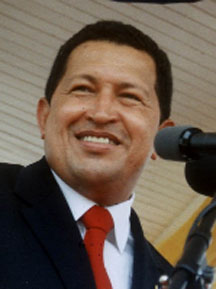CARACAS, (Reuters) – Osmar Herrera is the kind of Venezuelan that President Hugo Chavez had in mind when he launched his flagship health program eight years ago: sick, impoverished and in need of a break.
But Herrera’s predicament today illustrates how the socialist leader’s biggest social spending experiment fell off the tracks and may become a liability in next year’s election.
When the 60-year-old Herrera first started coughing up blood earlier this year, he sought help near his house at one of thousands of “barrio adentro” health centers that Chavez has built in poor neighborhoods, paid for with oil money.

Near collapse, Herrera was punted from one institution to another until eventually ending up in the thoracic ward of a run-down public hospital three hours from his home. He adores Chavez but laments his inability to provide hospitals in his area with the equipment they need to treat pneumonia.
“They should have it too, so that some people don’t have more than others, so that everyone is at the same level,” he whispered from his bed in a spartan, eight-patient room.
While the president, who is undergoing treatment for cancer, is whisked away to Cuba for chemotherapy as a pampered guest of its revolutionary leader Fidel Castro, frustration at home is mounting over marathon waits at crumbling hospitals and shortages of basic medicines and supplies.
The “barrio adentro” program — “within the neighborhood” in Spanish — began in 2003 with an ambitious promise to grant free health care to the most needy. Initially, the government built small primary care modules in Caracas’ many slums, staffed by Cuban doctors. The centers later mushroomed all across the country.
In subsequent stages, the government talked of building rehabilitation and diagnostic centers with technology imported from allies Cuba and China. It would also erect new hospitals in poor areas and refurbish existing ones.
The goal was widely applauded and the program’s early success boosted Chavez’ popularity. Several years on, however, only a small percentage of the projects have been completed and traditional hospitals have been starved of cash as the government pours money into the alternative system.
A self-styled revolutionary and populist, Chavez has framed the health debate as a struggle of the downtrodden against the elite. He is counting on his health and housing programs and discount food and clothing stores to win votes in the 2012 election, seen as a close race against the opposition.
LACK OF TRANSPARENCY
Nobody knows how much “barrio adentro” costs due to notoriously opaque fiscal accounts. Jorge Diaz, a health policy researcher, estimates the overall budget for public health reached 9 percent of gross domestic product in 2004, up nearly 500 percent from 1998 and above the 2 percent historical norm.
State oil company PDVSA, which invests some of its revenue from the OPEC country’s vast oil revenues in Chavez’ social initiatives, says it invested $650 million on “barrio adentro” last year and $6.36 billion from 2003-2010. Meanwhile, maternal and child health indicators have deteriorated and health coverage has not improved, according to research by Diaz at the Central University of Venezuela’s Center for Development Studies.
The country now has three parallel services with no coordination between them: “barrio adentro”, traditional public hospitals and private clinics. Surveys show Venezuelans are increasingly losing confidence in the two public options and turning to private care despite the cost.
Even Chavez declared in 2009 that there was a medical “emergency” after reports that 2,000 of the 6,700 “barrio adentro” modules had been abandoned.
“To summarize it in the simplest way, I would say this has been a rip-off,” Diaz said. “It started as an electoral bait with some health benefits but it turned into a fraud, not only for health reasons but a fraud of the national treasury.“
“WHERE DID THE MONEY GO?”
The gap between the idea and reality couldn’t be starker than at the dilapidated Jose Ignacio Baldo public hospital in Caracas’ low-income west side.
The pediatric care unit was “temporarily” closed in 2007 for renovations supposedly funded by “barrio adentro”. Four years later, it remains an empty shell in a yard overgrown with weeds but otherwise no signs of life. Five weathered billboards advertise projects awarded to contractors that never got done.
Doctor Maria Yanez, a kidney specialist, threw her hands in the air when asked recently how this was possible. “We have no idea what has been done with so much money,” she said. “A barrel of oil is at $107, for example, and a ton of money has entered the country.”
The 500-bed hospital with peeling paint and leaky ceilings is running at about 30 percent of its capacity. The one X-ray machine doesn’t work and many of its underpaid doctors have bolted the country in search of a better life elsewhere.





